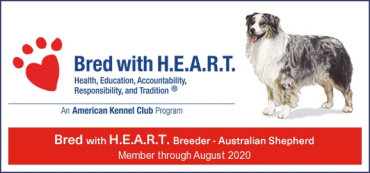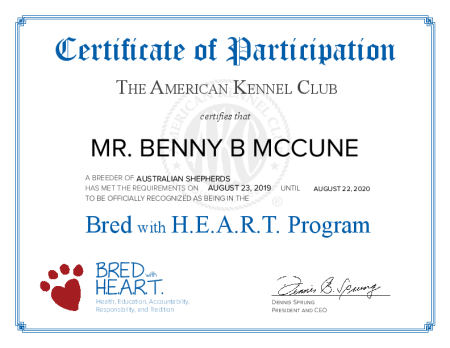

HONEYCREEKAUSSIES.COM
Australian Shepherds - The Breed that Works.
Honeycreek Australian Shepherds
We Love Our Friends
Aussie's - Loyal, Playful, Loving
The Family Welcomes You To Our World

The below was copied directly from the AKC site as I could not have written it any better. All credit for the below article is given to AKC.Org for their fine work in maintaining a excellent cite.
What is a responsible dog breeder?
A guide for being a responsible dog breeder.
Responsible Breeder Checklist
Responsible breeders want to know as much about you as you do about them. If the breeder won’t allow you to see where the breeding dogs are living, you should walk away.
In contrast to puppy mills, responsible breeders:
A responsible breeder is responsible for life.
Now comes the best part of being a breeder. (No, it is not putting away the newspaper liners and puppy food.) it is having those great families you selected call you with news of puppies first tooth, first veterinarian visit, first dog event, first win at an AKC event! it is getting letters. it is getting holiday cards. it is getting family portraits with your puppy (yes, it will always be yours) smack in the middle. What is not to love about being a breeder at these times?
But now can come the worst part too. it is the nice young couple who is divorcing and neither person can keep the dog. it is the distraught owner calling from the veterinarian with news of an unforeseen illness.
Responsible breeders are there for all situations both good and bad. They know they were responsible for this puppy being born, so they are responsible in a sense for it until the day it dies. They are willing to provide guidance and answer as many questions as they are asked. They are always concerned about their puppies.
A breeder once said the most satisfying phone call she received came 14 years after her first litter. The caller said one of her (the breeders) dogs had died of old age. At that moment the breeder knew she was responsible for bringing years of the same kind of love and joy she experienced from her dogs into another persons home. Ultimately, is not that exactly why you want to breed your dog?
A responsible breeder is always a student of the breed.
Responsible breeders seek to improve their breeds with every litter. They devote hours to continually learning as much as they can about their breeds, including health and genetic concerns, temperament, appearance and type. They also need to know about general dog behavior, training and healthcare. In short, they become canine experts.
How can you acquire this expertise?
Become active in dog clubs and events.
Each breed has a national club (or parent club), and there are thousands of local clubs devoted to individual breeds. (Local clubs are also called specialty clubs.) There are thousands of other clubs across the country, including all breed clubs and clubs devoted to Obedience, Tracking or Performance Events. Most clubs sponsor educational programs and events that will help you increase your knowledge. For lists of parent clubs and specialty clubs in your area, call AKC Customer Service, or visit our website.
Study your standard.
The breed standard is the official guide by which dogs are judged at dog shows. Each breed of dog recognized by the AKC has its own standard (written by the parent club). The standard may specify everything from the curvature of a dogs tail to the color of its eyes. You can access your dogs breed standard and order breed specific educational videos from the AKC website. Many parent clubs offer more detailed information on the standard,such as amplifications and illustrations.
Attend dog shows and events.
Dog Shows, Obedience Trials and Performance Events provide opportunities to observe purebreds in action. You can learn about different lines by viewing real dogs and studying the pedigrees of those you like. Many people competing at dog shows are experienced breeders. Others are interested in the sport as a hobby. Attending shows can give you the chance to meet and learn from these experts. READ, READ, READ!There are many books, magazines and websites available about every aspect of the dog experience. You will find books about individual breeds, groups of breeds, breeding and whelping, genetics, behavior and training and many more topics. The AKC publishes books such as The Complete Dog Book and Dog Care and Training, along with numerous videos. The AKC GAZETTE, which is published monthly, features breed specific columns and articles on topics ranging from developmental orthopedic disease to how to establish a club website. Most parent clubs produce periodic publications, as do many local clubs. The American Kennel Club offers a wealth of information about responsible breeding on its website. Novice breeders can read a step-by-step timeline about breeding the perfect (or close to perfect) litter. Registration and DNA certification information is included, as are articles written by experienced breeders and veterinarians. Responsible breeders are familiar with AKC rules and regulations concerning the sale and registration of AKC registrable dogs. Before you breed your dog, you should contact the AKC to verify that you have all the correct paperwork, understand how to register a litter, and are able to provide proper documentation to your buyers. To request AKC rules and regulations or order AKC publications, contact AKC Customer Service, or visit their website.
A responsible breeder is objective.
Virtually every dog is the best in the world in the eyes of its owner. Responsible breeders have the ability to separate their love for their dog from an honest evaluation of its good and bad points. Why is a detached point of view necessary? Breeding is hard work. Every breeding should be a carefully planned endeavor to produce a better dog.
A good breeder recognizes a dogs flaws and finds a mate with characteristics that will help reduce or eliminate those flaws. So how can you honestly evaluate your dog as potential breeding stock? Seek assistance from some of the best informational resources available longtime breeders and the breeder of your dog. This person should have extensive knowledge of your dogs line and, like you, should want to see it continually improved. An excellent way to develop an impartial eye is to test your dog against others. To see how well your dog conforms to the breed standard, get an assessment from an experienced breeder and dog fancier, and enter dog shows. Entering Obedience and Field Tests and Trials will allow you to measure your dogs intelligence, instincts and abilities. If your dog is a success in these events, you will be more confident that breeding your dog will contribute to the betterment of its breed.
A responsible breeder is aware and conditions the Sire and Dam.
Good puppies start long before their parents are bred. Both the sire and dam need constant care, or conditioning, to produce the best offspring. This means regular veterinary care, screening for genetic problems, pre-breeding health tests, regular exercise and good nutrition. It means consulting with a veterinarian or experienced breeder to ensure that you know how to meet the dams (mothers) special nutritional needs while she is in whelp (pregnant). It also means maintaining your dogs mental health. Stressed animals can experience fertility problems. Many breeders swear by the belief that the dams temperament affects the puppies good puppies come from good mothers. Consequently, they avoid breeding shy or unstable dogs.
A responsible breeder nutures the puppies.
Preparing for puppies means building a proper nursery. A whelping box must be dry, very warm and draft-free. It should be big enough for the dam to be able to move about freely with sides that will safely contain the puppies. The dam normally takes care of the puppies needs the first few weeks of their lives. Of course, you should be prepared for unusual but serious situations, such as a dam with no milk or an orphaned litter. You will also need to provide additional food and water for the dam while she is nursing the puppies. Once the puppies are weaned, they become much more active and require lots more work. You will need to oversee feeding to ensure each puppy gets adequate food. You will need to frequently change and keep the towels or shredded newspaper lining the whelping box clean. The puppies will need their first round of shots, they may need grooming and they will definitely need plenty of playtime and opportunities for getting used to being around people. You may even want to start working with them on basic obedience commands to ease their transition to their new homes.
A responsible breeder questions new owners and places puppies wisely.
As you can probably imagine, once it is time for the puppies to go to new homes, you have invested a lot of yourself in them. A difficult and important aspect of breeding is making sure your puppies go to owners who will provide loving and permanent homes. The complete picture is important to responsible breeders. They make sure new puppy owners know what to expect, the pros and the cons, from the furry little bundles they are taking home. If their particular breed requires extensive grooming, drools profusely or can be difficult to train, responsible breeders will point that out. They will also provide all the necessary paperwork for new owners to register their dogs with the AKC, which will allow them to participate in the sport of purebred dogs and take advantage of special offers regarding complimentary first veterinary office visits and pet healthcare insurance. Responsible breeders also know the right questions to ask prospective owners in order to get a feel for the type of home they will provide.
Some of these questions include:


